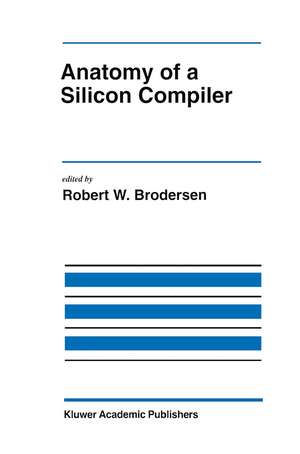Anatomy of a Silicon Compiler: The Springer International Series in Engineering and Computer Science, cartea 181
Editat de Robert W. Brodersenen Limba Engleză Paperback – 9 oct 2012
Anatomy of a Silicon Compiler examines one such compiler in detail, covering the basic framework and design entry, the actual algorithms and libraries which are used, the approach to verification and testing, behavioral synthesis tools and several applications which demonstrate the system's capabilities.
| Toate formatele și edițiile | Preț | Express |
|---|---|---|
| Paperback (1) | 948.61 lei 6-8 săpt. | |
| Springer Us – 9 oct 2012 | 948.61 lei 6-8 săpt. | |
| Hardback (1) | 954.77 lei 6-8 săpt. | |
| Springer Us – 30 iun 1992 | 954.77 lei 6-8 săpt. |
Din seria The Springer International Series in Engineering and Computer Science
- 24%
 Preț: 1041.97 lei
Preț: 1041.97 lei - 20%
 Preț: 643.50 lei
Preț: 643.50 lei - 18%
 Preț: 1225.62 lei
Preț: 1225.62 lei - 18%
 Preț: 965.02 lei
Preț: 965.02 lei - 20%
 Preț: 646.12 lei
Preț: 646.12 lei - 18%
 Preț: 948.79 lei
Preț: 948.79 lei - 20%
 Preț: 646.62 lei
Preț: 646.62 lei - 15%
 Preț: 637.46 lei
Preț: 637.46 lei - 20%
 Preț: 643.83 lei
Preț: 643.83 lei - 18%
 Preț: 949.23 lei
Preț: 949.23 lei - 20%
 Preț: 644.48 lei
Preț: 644.48 lei - 20%
 Preț: 994.92 lei
Preț: 994.92 lei - 20%
 Preț: 645.97 lei
Preț: 645.97 lei - 18%
 Preț: 946.87 lei
Preț: 946.87 lei - 20%
 Preț: 995.57 lei
Preț: 995.57 lei - 18%
 Preț: 956.99 lei
Preț: 956.99 lei - 20%
 Preț: 644.98 lei
Preț: 644.98 lei - 15%
 Preț: 649.54 lei
Preț: 649.54 lei - 18%
 Preț: 950.21 lei
Preț: 950.21 lei - 18%
 Preț: 1221.38 lei
Preț: 1221.38 lei - 18%
 Preț: 957.62 lei
Preț: 957.62 lei - 15%
 Preț: 643.99 lei
Preț: 643.99 lei - 18%
 Preț: 948.47 lei
Preț: 948.47 lei - 18%
 Preț: 947.35 lei
Preț: 947.35 lei - 20%
 Preț: 1284.65 lei
Preț: 1284.65 lei - 20%
 Preț: 1633.95 lei
Preț: 1633.95 lei - 20%
 Preț: 1285.78 lei
Preț: 1285.78 lei
Preț: 948.61 lei
Preț vechi: 1156.84 lei
-18% Nou
Puncte Express: 1423
Preț estimativ în valută:
181.54€ • 187.54$ • 151.09£
181.54€ • 187.54$ • 151.09£
Carte tipărită la comandă
Livrare economică 25 martie-08 aprilie
Preluare comenzi: 021 569.72.76
Specificații
ISBN-13: 9781461365860
ISBN-10: 1461365864
Pagini: 384
Ilustrații: XV, 362 p.
Dimensiuni: 155 x 235 x 20 mm
Greutate: 0.54 kg
Ediția:Softcover reprint of the original 1st ed. 1992
Editura: Springer Us
Colecția Springer
Seria The Springer International Series in Engineering and Computer Science
Locul publicării:New York, NY, United States
ISBN-10: 1461365864
Pagini: 384
Ilustrații: XV, 362 p.
Dimensiuni: 155 x 235 x 20 mm
Greutate: 0.54 kg
Ediția:Softcover reprint of the original 1st ed. 1992
Editura: Springer Us
Colecția Springer
Seria The Springer International Series in Engineering and Computer Science
Locul publicării:New York, NY, United States
Public țintă
ResearchCuprins
1 Introduction and History.- 1.1. What is Lager.- 1.2. Users vs. Developers.- 1.3. History.- 1.4. Assembly vs. Behavioral synthesis.- 1.5. Book Organization.- I Framework and Design Entry.- 2 The OCT Data Manager.- 2.1. Basic Structure.- 2.2. Policy Versus Mechanism.- 2.3. The OCT Objects.- 2.4. The OCT Procedural Interface.- 2.5. OCT Physical Policy.- 2.6. OCT Symbolic Policy.- 2.7. Summary.- 3 Lager OCT Policy and the SDL Language.- 3.1. Lager Policies.- 3.2. The Structure_Master View and the SDL Language.- 3.3. The Structure_Instance View.- 3.4. The Physical View.- 3.5. Summary.- 4 Schematic Entry.- 4.1. Schematic Tool Interface.- 4.2. Design Examples.- 4.3. Summary.- 5 Design Management.- 5.1. Parameterization and Library Support.- 5.2. The Design Flow Strategy.- 5.3. Controlling the Design Flow.- 5.4. The Design Management Strategy.- 5.5. Summary.- 6 Design Post-Processing.- 6.1. Capabilities.- 6.2. The Post Processing Tools.- 6.3. Runtime Operation.- 6.4. Summary.- II Silicon Assembly.- 7 Hierarchical Tiling.- 8 Standard Cell Design.- 9 Interactive Floorplanning.- 10 Datapath Generation.- 11 Pad Routing.- III Verification and Testing.- 12 Design Verification.- 13 Behavior and Switch Level Simulation.- 14 Chip and Board Testing.- IV Behavioral Synthesis.- 15 DSP Specification Using the Silage Language.- 16 Synthesis of Datapath Architectures.- 17 From C to Silicon.- 18 An FIR Filter Generator.- V Applications.- 19 The PUMA Processor.- 20 Radon Transform Using the PPPE.- 21 Speech Recognition.- 22 Conclusions and Future Work.- Appendix a Design Example.- A.1. Running Dmoct to Generate a Design.- A.2. Design Post-Processing with Dmpost.- Appendix B Training and Distribution.- B.1. Training.- B.2. Lager Distribution.





























